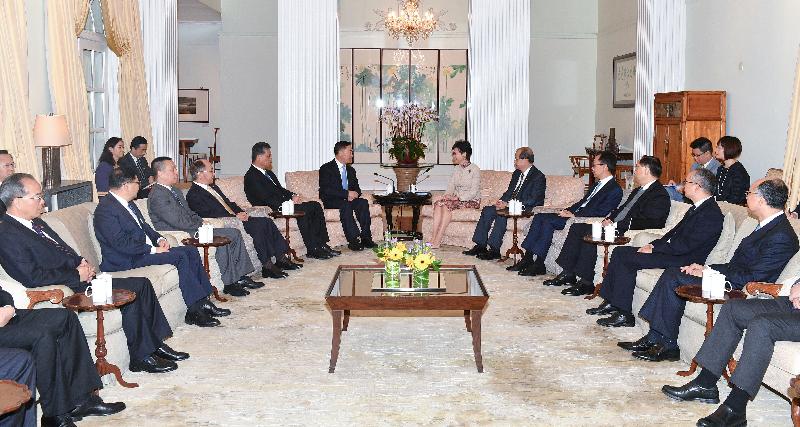Following is the speech by the Chief Secretary for Administration, Mr Matthew Cheung Kin-chung, at the Reception Celebrating the 2nd Anniversary of Karolinska Institutet Ming Wai Lau Centre for Reparative Medicine today (November 20):
Mr Ladeborn (Deputy Consul General of Sweden in Hong Kong, Mr Joakim Ladeborn), Professor Ceccatelli (Director of the Karolinska Institutet Ming Wai Lau Centre for Reparative Medicine, Professor Sandra Ceccatelli), Professor Li (Director of the Hong Kong node of the Karolinska Institutet Ming Wai Lau Centre for Reparative Medicine, Professor Ronald Li), Dr Göritz (Lau Fellow of the Karolinska Institutet Ming Wai Lau Centre for Reparative Medicine, Dr Christian Göritz), distinguished guests, ladies and gentlemen,
Good evening. It is my pleasure to join all of you here today, celebrating the second anniversary of the Karolinska Institutet Ming Wai Lau Centre for Reparative Medicine in Hong Kong. I would like to extend a warm welcome to our prestigious speakers and professionals who are attending the reception.
The Karolinska Institutet is one of the most prestigious and renowned medical research universities in the world, a leading university from which its Nobel Assembly has selected Nobel laureates in physiology or medicine since 1901.
In 2016, the inauguration of the Karolinska Institutet Ming Wai Lau Centre for Reparative Medicine in Hong Kong, focusing on accelerating research in stem cell biology, biomedical engineering, biotechnology and regenerative medicine, marked an important milestone of collaboration between Hong Kong and Sweden in the field of medical sciences.
More importantly, as the Karolinska Institutet’s first overseas branch, the Centre has brought Hong Kong’s potential in biotechnology research and development to the international stage. Hong Kong is well positioned to develop into a regional hub of medical research and enjoys a number of advantages that are significant to the successful building up of first-class medical research infrastructure. We have an efficient public healthcare system with a properly maintained centralised system of patient records in electronic form, covering the majority of the population; our universities are well known for producing reliable, accurate and scientifically valid empirical data, translating academic research to clinical applications.
In fact, Hong Kong’s clinical trial standard and laboratory data are widely accepted by the Mainland, American and European regulatory agencies. Last but not least are our respect for personal and data privacy, simple and transparent tax structure, intellectual property rights protection system and a trusted legal system with an independent judiciary that safeguard the interests of all stakeholders.
In 2011, the Food and Health Bureau of the HKSAR Government established the HK$1.5 billion Health and Medical Research Fund (HMRF). Through generation and application of evidence-based scientific knowledge derived from local research in health and medicine, it is expected that the fund would help members in healthcare and related fields to strengthen research capacity, facilitate health and medical research, enhance healthcare practices, advance standards and quality of care, and promote clinical excellence. In 2016, the scope of the HMRF was further expanded to incorporate the Health Care and Promotion Fund to support evidence-based health promotion projects. These help people adopt healthier lifestyles by enhancing awareness, changing adverse health behaviour and creating a conducive environment that supports good health practices.
Apart from supporting research and development, the HKSAR Government recognises that a robust regulatory system is equally important to guarantee treatment safety and efficiency, which in turn supports the growth of the biomedical industry. In this regard, we have already started to conduct a consultation on the regulatory framework of Advanced Therapy Products. Looking forward, we will work closely with stakeholders including academia and the medical industry to iron out the details of a statutory regulatory framework, with a view to introducing the legislative proposal into the Legislative Council in 2019.
The HKSAR Government will continue to enhance and expand our innovation and technology infrastructure, foster partnerships with world-class academic institutions and renowned enterprises and attract them to set up overseas centres in Hong Kong. To this end, we are pressing ahead with the establishment of two innovation and technology research clusters, one of which focuses on healthcare technologies, at the Hong Kong Science Park.
On this note, I would like to thank the Consulate General of Sweden and the Karolinska Institutet Ming Wai Lau Centre for Reparative Medicine for giving me the opportunity to share my views with you today. Thank you. read more




